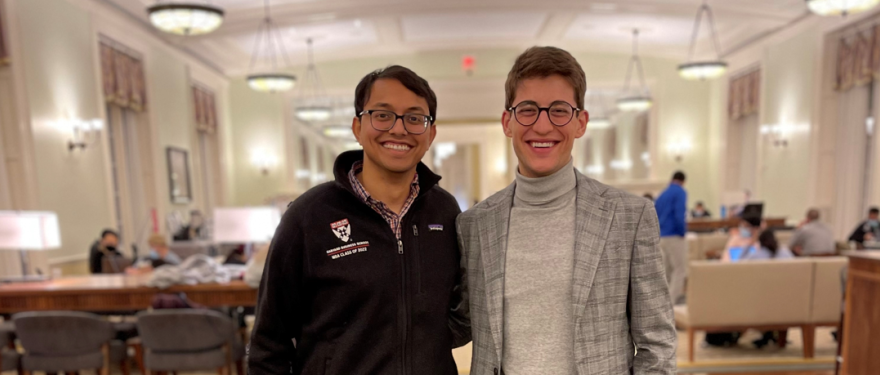With their podcast, Alexey Youssef (MBA 2022) and Shad Faraz (MBA 2022) bust the myth that physicians cannot venture outside the traditional career path.
In my first year of university, one of my professors hosted a special session on “how to talk like doctors.” I was studying biomedical engineering and was required to spend equal amounts of time at a laboratory, in front of a computer and at the hospital. “Doctors,” this professor said, “won’t trust you if they know you are engineers.” I later came to know he was being too dramatic, but it certainly helped to have a common language and mutual understanding. I recalled this story while I logged on Zoom to talk to Alexey Youssef (MBA 2022) and Shad Faraz (MBA 2022) about their podcast. Physicians Off the Beaten Path is a podcast that, episode by episode, busts the myth that physicians cannot venture outside the traditional career path.
Faraz and Youssef lead by example. Faraz is a physician, writer and current MBA student at Harvard Business School. He has an MD from Cornell University and his writings have been published in The New York Times, NPR, CNN, New York Daily News, and more. He is interested in healthcare innovation. Youssef is a medical doctor and the first Syrian Rhodes Scholar. He has an MD from Syria, an MSc in International Health at Oxford and is currently doing an MBA at Harvard Business School along with a PhD in computer science (clinical AI) at Oxford. Their experience outside the traditional path attracted lots of questions from colleagues and friends, which pushed them to structure an approach to answering those questions, and their podcast was born.
“Medicine is all-consuming. To be a good doctor you need to spend all of your time doing that,” shares Faraz. This makes it difficult for healthcare professionals to know about the world beyond the hospital’s walls. “A lot of them are interested, but there is no formal avenue. All existing resources assume a certain level of knowledge, but our colleagues need us to start from the ground up.” They knew they wanted to create content targeted to everyone in the medical space. They also knew their content should be interesting, easy to consume and eye-opening to all the possibilities there are outside of medicine. They realized the best media would be a podcast lasting 30-45 minutes—the time for a commute.
“My thinking is that so many people fall into medicine not really without thinking about alternative career paths. It becomes a cycle, because there are not many examples of people who went outside the traditional path to inspire others,” says Youssef. “We want to expose them and highlight successful cases to give inspiration to medical doctors and medical residents of alternative career paths if that’s what they want to do.” Their podcast features interviews with physicians who pursued careers outside of or complementary to medicine. Physician-investors, physician-entrepreneurs, and physician-bankers are some of the types of guests they have interviewed. “The workload is very high so you don’t get exposure to other career opportunities. The path is a very siloed trajectory. That’s how we think about exposure,” says Faraz.
“There is far more to medicine than only working in a hospital.” — Dr. Martin-Immanuel Bittner (Physician, Entrepreneur, Co-founder and CEO of Arctoris)
Recalling my experience at university, I asked them how they manage the tension between a strong lack of exposure to the outside world and their mission to expand that exposure. “Medicine not only prepares you to do clinical medicine, but also gives you a transferable skill set,” says Faraz. “In terms of transferable skills, most of our guests talk about communication. And thinking on your feet. [At my consulting internship] I found that managing patients is not very different from managing clients. Both have an understanding of what needs to happen and what the solution to their problem is. They could be right, they could be wrong, but you need to bring them along in the journey, you can’t just talk them out of it. It’s very difficult to have this kind of conversation. Doctors do that every single day, and it’s something you just can’t learn in a school. It’s learning by doing.”
Those transferable skills make it easier for their audience to follow, but they still do an incredible job in adapting the communication. “We don’t use abbreviations, we define everything. For example, if we have a VC [venture capital] guest, we spend time explaining what the industry is, how funds are structured, what are the incentives, and how doctors can add value. We are very deliberate about bringing our audience along,” explains Faraz. Their effort is being rewarded with an engaged and enthusiastic audience.
A critical part of the process is bringing guests to the podcast, and that is where the HBS network is proving invaluable. “The access we have in this network. We just started and we’ve already interviewed a Pulitzer prize winner, a New York Times best seller… It’s incredible the people who want to talk to us. We are uniquely positioned to expose everyone else to this.”
“At the end of the day, it wasn’t necessary that I needed to…treat patients. But I needed to have impact.” — Dr. Dan Gebremedhin (Physician, Venture Capital Investor, Entrepreneur)
Listen to their podcast at https://potbppodcast.castos.com/
This article was originally published by The Harbus on October 8, 2021.

